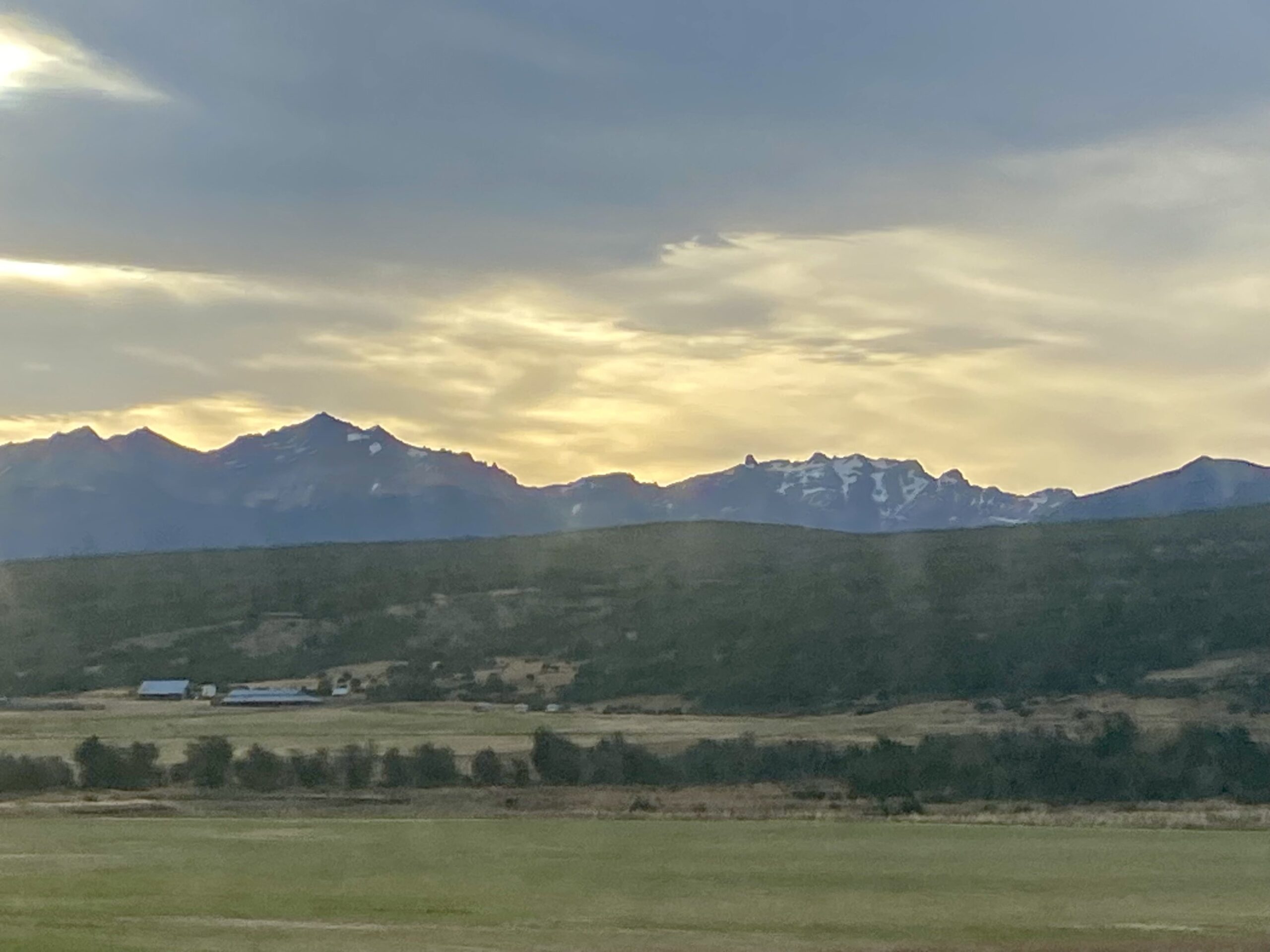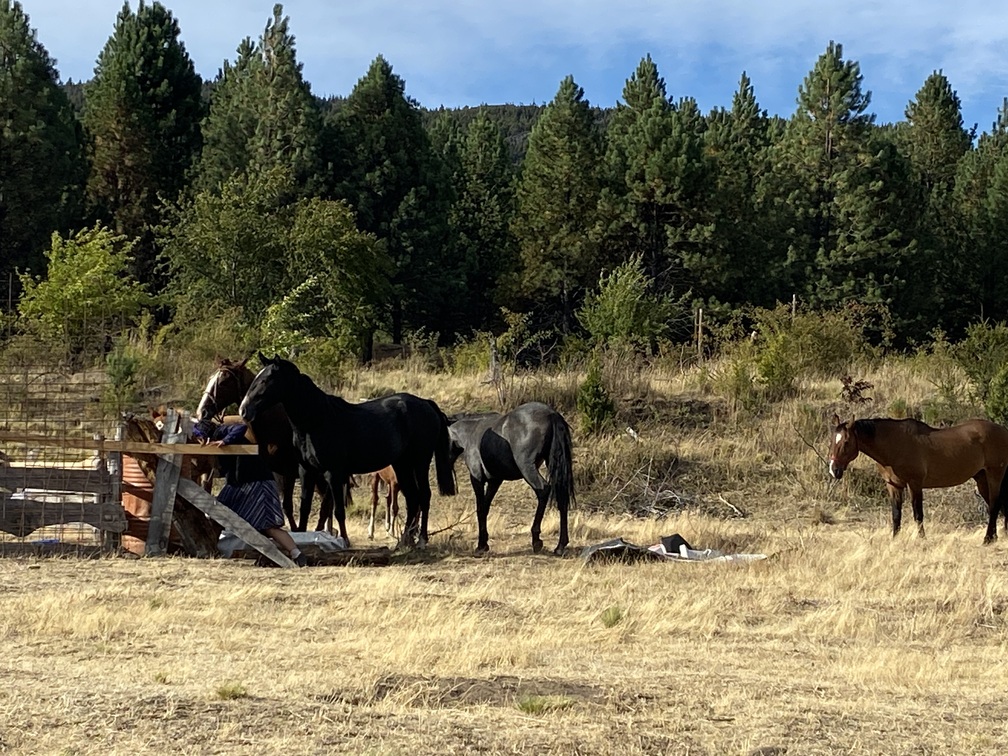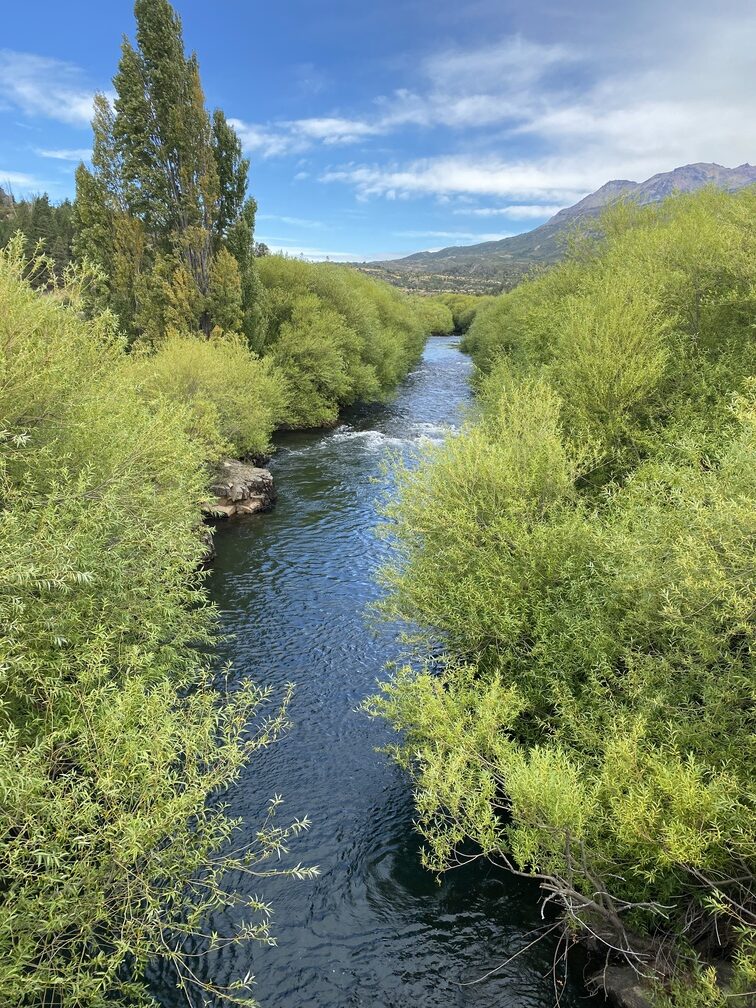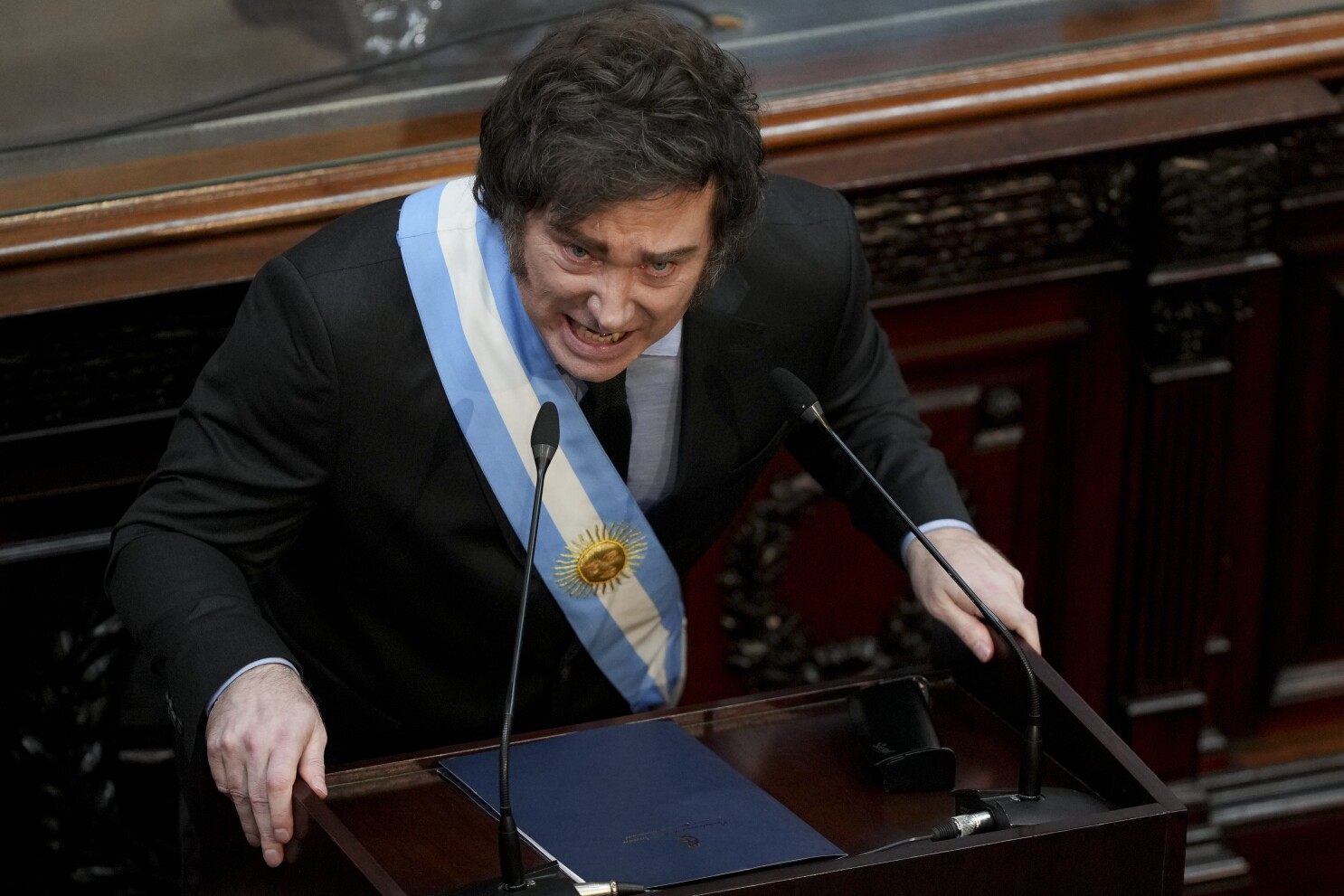
By Laura Carlsen
Some 40 people form a circle on the dusty, late-summer grass. Following days of uncertainty and fear, cut off from most forms of communication, families from Mapuche communities in Argentina’s Chubut province gather to talk about what happened to them on Feb. 11.
At 7 AM that Tuesday, hundreds of Argentina’s armed provincial and federal police forces raided their homes, smashing windows and destroying belongings. The special forces, wielding assault rifles, held men, women and children at gunpoint for more than ten hours.
During their day of terrorizing Mapuche families, police took cell phones and computers, leaving the communities—spread over miles at the eastern base of the Andes—cut off from each other. They confiscated books and farm tools, forced indigenous men, women and children to give DNA samples, semi-stripped young women and photographed tattoos and other body markings, manhandled elders, and separated young children from their parents while forcing toddlers to witness the violence against their mothers. In the twelve simultaneous strikes, police also broke into a Mapuche community radio in El Maiten, Radio Petu Mogelein, and destroyed vital communications equipment.
These communities, often just a handful of indigenous families that survived the bloody campaigns of genocide and displacement throughout Argentina’s colonial history, are the now the target of a new offensive under the “anarchocapitalist” policies of Javier Milei. The repression aims at stripping them of the little they have left of their ancestral territory and placing it in the hands of some of the world’s largest corporations and wealthiest billionaires.
Trawun, testimony
Outside one of the homes that was raided, Mapuche community members described the violence. A few international journalists and representatives of regional human rights organizations observed the trawun—a community gathering to share information, repair the community and plan strategy. We strained to hear the words of their testimonies as the wind whipped through a stand of poplar trees.
An 84-year-old elder pushed up his sleeve to show bruises from being thrown to the ground and cuffed by police. Young women described being forced to lie face down on the floor for hours and as police intimidated them with their guns. Children witnessed scenes of brutality that will mark them for life.
For hours the security forces refused to present a judicial order or inform indigenous families of the reason behind the violent invasion of their homes. Authorities finally presented a judicial order, signed by judge Jorge Criado, who was formally accused of racial discrimination against the Mapuche in a 2020 case, to investigate a vandalism attack Jan. 18 in Estancia Amancay 80 kilometers away.
Police arrested Victoria Núñez Fernández, a 37-year-old member of the Lof Pillan Mawiza who has lived with and worked with the Mapuche community for years. Witnesses and evidence from GPS records prove that Núñez Fernández was miles from the scene at the time the equipment was set on fire, but the judge ordered 60 days of house arrest as government authorities continue to declare her guilt.
Forest fires as a smokescreen
Since they began in December, Argentine government propaganda has blamed the Mapuches for forest fires that have burned more than 50,000 hectares of mostly national forest land in Patagonia. It’s a triple ploy– to distract from the role of climate change and government negligence in the fires, to divert attention from real estate interests waiting to take over land for megaprojects, and to criminalize the indigenous people who are the last the remaining bulwark against the mass exploitation and destruction of one of the world’s largest freshwater and forest reserves.

“It’s so outrageous that we should be blamed when actually the Mapuche community has always done everything to protect life here. We´re part of the territory that we defend, and we’re going to protect the life of the river, the life of the mountain, the life of the forest”, Evis Millán of the Lof (community) Pillan Mawiza told me in an interview at her ranch by the river.
“We would never set fire to it. This set-up that the government of Chubut is carrying out with the national government has a clear objective–to name an internal enemy to cover up the criminalization and eviction of the Mapuche communities.”
Without a trial or investigation, the day after the police operation, Governor Ignacio Torres of Chubut province presented a PowerPoint accusing the Mapuche of the fires and the vandalism. Flanked by hooded agents bearing machine guns in what was supposed to be a press conference, he projected the faces of four indigenous women, calling them “the persons responsible for the attack [on Amancay]” and swore “they will rot in jail”. Among them was Victoria Núñez Fernández, still in custody, and Moira Millán. Moira Millán is an internationally known indigenous land defender, novelist and women’s rights leader.
Torres’ performance followed a playbook handed down from the far-right government of Javier Milei and his Minister of National Security Patricia Bullrich. Bullrich, whose ministry is also responsible for preventing and controlling forest fires, has long promoted usurping land from indigenous peoples for sale on the international market. Following the raids, she released a video with images of the police raid on Millan’s home, stating, “These people will be declared under Article 41 TER-ROR-ISTS”.
Milei’s government established the legal framework for this extreme measure just days after the raids, when it listed “RESISTENCIA ANCESTRAL MAPUCHE (RAM)” (Mapuche Ancestral resistance) as a terrorist organization in the Public Registry of Persons and Entities linked to Acts of Terrorism and its Financing. The RAM is an invention to smear the Mapuche people; the communities have stated repeatedly they have no knowledge of or contact with it. There’s only one person identified with the RAM, Facundo Jones Huala. Despite taking credit for the vandalism at Amancay, Jones Huala has not been arrested and makes no effort to hide from authorities. Meanwhile, the government continues hold Núñez Fernandez on trumped-up charges and to make the untenable claim that a handful of Mapuche women torched the forests they live in as an act of revenge for efforts to displace them.
Mapuches in the Patagonia point to powerful economic interests with ties to Milei’s government as the real culprits behind the fires.
A fire sale of the Patagonia
The forest fires that destroyed thousands of acres in the summer months are finally being quelled by autumn rains. Experts have warned that the high temperatures and low rainfall caused by climate change is behind rising fire destruction in the region. But local governments and the government of Javier Milei—a climate change denier—prefer to blame the Mapuche, while taking advantage of the destruction to privatize a land coveted for its minerals and pure water, and for its natural beauty and remoteness.
Milei began preparations to sell off the Patagonia to foreigners as soon as he took office. Using presidential decrees, he repealed the law that limited foreign land ownership on Dec. 21 as part of a package of decrees to deregulate the economy and promote sale of resources to foreign investors.
In what seem to be moves to increase the vulnerability of protected natural reserves, he eliminated the Fund for the Protection of Forests and transferred responsibility to the security ministry, leaving a huge void in know-how, infrastructure and funding to confront forest fires, despite the fact that each year fire destroys more forest land. He also cut spending of the National Service for Fire Management by 81%.
Milei also announced the repeal of the law that bans the immediate sale of land affected by fire for agribusiness and real estate development. This kind of law exists in most countries as a necessary safeguard against business incentives to torch public lands. Although the repeal has not gone into effect yet, it recently passed committee in the Senate and continues to be a key element in the government’s plan for a massive fire sale of Patagonian lands.
Mining companies, real estate interests, hydroelectric plants and other megaproject developers have long waited to get their hands on more land in Argentina’s Patagonia. Milei is banking on the sell-off of indigenous territories and resources to help pay for the huge debt he hopes to receive in order to prop up the Argentina peso and avoid the total collapse that looms under his radical free-market policies.
Neocolonialism, rebooted
The Milei government has mapped the road forward for the Patagonia, and it runs right over the bodies and the territories of the Mapuche people. To mask its own complicity with business interests hoping to move onto affected lands, the Milei government launched a media and legal strategy to deflect attention from the link between the fires and land-use changes that stand to benefit billionaire foreigners, and to neutralize the Mapuche-Tehuelche people who stand in their way through criminalization, eviction and extermination.
The formula is not new. Crusades against the Mapuche began with the conquest of their ancestral lands centuries ago and has not let up since then. The current crisis has the same colonial roots as previous genocidal campaigns: racism and the takeover of land and resources by force.
In January, Bullrich ordered the eviction of the Lof Pailako in the Los Alerces National Park. To avoid bloodshed, community members abandoned their homes hours before the arrival of police forces. Families were left homeless, animals without sustenance and children without access to housing, health or education. Bullrich stated triumphantly: “This is the first eviction of a series that will mark the end of a period in which a lack of respect for private property reigned in Argentina.”
The Minister of Security acts with the full backing of the federal and provincial governments. Milei, an admirer of Donald Trump and member of the international far right, launched the offensive against the Mapuche with his trademark free-market and white supremacist zealotry. While giving investors free rein, he ended indigenous land registry programs and rescinded Law 26.160, the Emergency Indigenous Territory Law of 2006 that at least nominally suspended evictions of indigenous communities in indigenous territory. Despite having signed on to international indigenous rights treaties, successive governments of both the right and the left failed to institutionalize recognition of land and rights, paving the way for Milei to revert gains and protections for the communities.
Human rights organizations have denounced the repeal of indigenous rights to the Inter-American Commission on Human Rights, the Inter-American Court of Human Rights, the Office of the Rapporteur on Indigenous Peoples and the United Nations High Commissioner for Human Rights.

The billionaire bonanza
As the Mapuche are violently evicted from the few hectares of land they live on, international billionaires already own, often illegally, millions of hectares in the Argentine Patagonia and are looking to take over more. The ultra-rich set their sights on this land with its sweeping views of the Andes and miles of clear lakes and open woods decades ago. The region holds much of the earth’s remaining fresh water, clean air and pristine forests. Corporations have moved in to exploit natural resources, and individual billionaires see the region as their private playground and a refuge for when the rest of the planet becomes inhabitable.
A case point is Lago Escondido, property of the British multimillionaire Joe Lewis. Lewis owns 12-14 thousand hectares including the entire lake. Although he has entertained Argentine presidents and foreign dignitaries on his property, it’s sealed it off to public access by physical barriers and armed guards. Other foreign interests with extensive holdings in the Argentine Patagonia include the Israeli firm Mekorot, the Italian firm Benetton, the actor Sylvester Stallone, and investment companies from United Arab Emirates, among others.
Like Trump, Milei’s government of the rich and for the rich has acted fast to remove environmental and social restrictions. Milei instituted a new Incentive Regime for Large Investments (RIGI by its Spanish initials) last year that provides tax breaks, customs incentives and foreign exchange benefits for projects of more than 200 million dollars that are initiated within two years. The law will promote the kind of large-scale extractivist projects that citizen groups and Mapuche communities have opposed for uprooting communities and destroying the land.
An analysis of the likely impact of RIGI in Chubut finds that the Patagonian province could see a rapid boom in mining and oil and gas exploitation. Chubut has a ban on open-pit mining–the result of grassroots organizing. Experts fear a legal challenge that could result in overturning the popular will expressed in the ban.
RIGI and the other programs to sell the Patagonia to foreign investors set the scene for local conflicts over land and resource use. Billionaire land owners stand to profit enormously from Milei’s measures and already have drawn up plans to expand holdings and operations.
The attacks, expulsions and criminalization of the Mapuche communities can be seen as a preemptive measure to weaken forces that defend native lands and environmental protection.
Reinforcing the Police State
The federal government has prepared to put down resistance by legalizing violent repression of local and national opposition. On March 10, Congress passed the so-called “Anti-Mafias Law” that mandates that all members of a group can be given the same sentence as a single member, a law the international associations of jurists and human rights organizations have called the “legalization of a virtual state of siege” especially designed to apply to those most hurt by Milei’s measure–the poor, political opposition, unionists and indigenous peoples.
Milei’s government also adopted an “anti-picket protocol” that criminalizes protest. These measures have led to more than a thousand protesters injured due to excessive use of force, according to a report by Amnesty International. Most recently, police fired a gas canister directly at a photographer during March 12 protests. The photographer Pablo Grillo, whose skull was broken, is still in intensive therapy.
The recreation of a brutal police state in Argentina conjures images of the military dictatorship, a period of state terrorism that lasted from 1976 to 1983. Millan warns that the Milei government is a dictatorship and that the country is seeing a return to the “state terrorism” that led to thousands of assassinations and disappearances during the military dictatorship.
When Caring for Land and Culture Means Risking your Life
It’s not surprising that the regime has made indigenous women the center of its defamation campaign. Women are the core of Mapuche defense of their territory and the protection of the land and life against extractivist projects and privatization. They’ve worked for decades to consolidate and reestablish communities in ancestral lands, teach new generations the Mapuche language and customs, and build peaceful resistance. The latest government-corporate offensive has put their lives and liberty at grave risk.

“This group in power—patriarchal, racist —feels threatened by the capacity and the defense of life that we women carry out,” Moira explained in a recent interview. “The State and the corporations know that women can build alliances among sectors to defend rights so they need to weaken this strong organizational process in this historic moment, including at the global level.” In this context she added, the openly misogynist attacks of the Milei government are strategic, they’re being incorporated into public policy, and they are a focus of repressive policies.
Despite all the forces against them, today’s Mapuche communities continue to live on and care for their land. They protect the rivers and lakes, and manage the forests to keep trees healthy, prevent fire damage and control invasive species. Some have lived on these lands continuously for generations, others have returned from forced migration to urban slums to rebuild their lives, their land and their identity.
Almost every day during the weeks of our visit, the women left the house early to hold traditional ceremonies. Language, spirituality, and ancestral knowledge and practices are nourished through daily life, family and community ties. Even after the genocidal campaigns and the speeches devoted to denying their existence (the government frequently speaks of “pseudo-Mapuches”) or spreading hate, these communities still survive and it’s because of them that the region still offers world-famous fresh water, abundant fish and unspoiled views.
The power of example can be more threatening to illegitimate power than might. Two radically different views of the land and humans’ relationship to it are in play here. As plans advance to create an extractivist enclave out of nature’s masterpiece, Moira Millán summed it up: “We have firmly opposed extractivist large-scale mining, dams, hydroelectric projects that would murder the river to provide electricity to transnationals and lately the aqueduct that oil companies are pushing for. The Mapuche people recover land to reaffirm the commitment to life. For us, life is the most important. And not just human life, the life of everything in our surroundings.”



